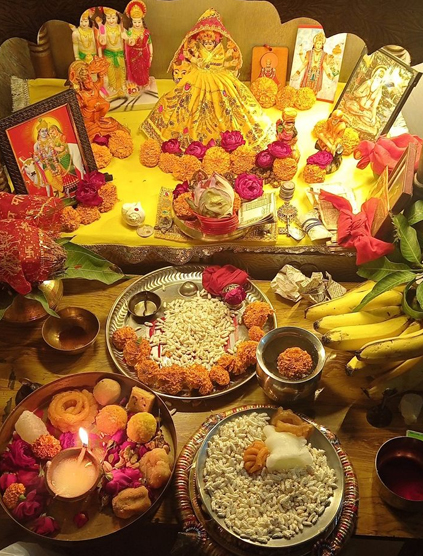Tulsi Vivah: A Celebration of Devotion and Purity
Samagri
for Puja:
Haldi [organic] (20gm), Kumkum [organic] (20gm), Tulsi Mala (1), Diya Batti (5), Beetle Nuts (5), Desi Ghee (20ml), Honey (20ml), Jaggery (Gudh) (20gm), Akshata [Yellow rice] (20gm), Yagno-paveetha (5), Karpoora [camphor] (5Tabs), Red/White/Yellow Cloth(1 mtr), Prasad [Laung, Elaichi, Mishri] (20gm), Mouli (25mtr), Ganga Jal (15ml), Durva [fresh] (1), Agarbatti (6)/Dhoop (2), Dakshina (100INR), God Idols (pair), Sambrani (2), Sambrani Holder (1), Kalash [small copper] (1), Panchpatra [small copper] (1), Diya Holder (2), Panchamrit spoon (1), Karpoora Holder(1), includes perishables [Beetle Leaves [fresh] (9), Flowers [fresh] (incl mala), Tulsi [fresh], Mango Leaves [fresh] (7)]
Small Havan:
Cow Dung Cake (2), Mango Wood (250gm), HavanSamagri [20+ Grganic Herbs] (100gm), Ghee (20ml)
Yajman to provide:
Curd (100gm), Milk (100ml), Mithai (250gm), Fruits [5types], Coconut (1), HavanKund, SuchiSarva (Havan Spoon) (1), Kalash [big] (1), Bowl [preferably copper/silver] (1), Spoon [preferably copper/silver] (1), Utensils [2 big Plates (for Aarti/Samagri), disposable Plates, Bowls & Spoons], First solid food (preferably Kheer or Payasam)
Importance and Significance of Tulsi Vivah
Tulsi Vivah is deeply rooted in Hindu tradition and symbolizes the divine union of devotion and spirituality. The festival highlights the importance of Tulsi in worship and her role as a goddess. It is believed that by participating in Tulsi Vivah, devotees receive blessings for happiness, prosperity, and marital harmony. The event underscores the significance of Tulsi in daily worship, emphasizing her role as a protector and healer.
Benefits of Tulsi Vivah
- Spiritual Growth: The ritual deepens one’s connection with the divine and encourages a life of devotion.
- Health and Purity: Tulsi is known for its medicinal properties; worshiping her is believed to bring health benefits.
- Marital Harmony: Participating in Tulsi Vivah is thought to promote love, fidelity, and harmony in marriages.
- Cleansing Energies: The festival is an opportunity to cleanse the environment and promote positive energies within homes.
Occasions to Perform Tulsi Vivah
Tulsi Vivah is primarily celebrated on:
- Prabodhini Ekadashi: The most significant day for the festival, marking the start of the wedding season.
- Other auspicious days: Some communities may celebrate it on other significant dates as well, depending on local customs.
Tulsi Vivah Vidhi (Procedure)
- Preparation: Clean the puja area and gather necessary items, including a Tulsi plant, a small idol or picture of Lord Vishnu or Lord Krishna, flowers, sweets, and a ceremonial thali.
- Setup: Create an altar with the Tulsi plant at the center, adorned with flowers and a diya (lamp). Place the idol or picture of Lord Vishnu nearby.
- Invocation: Begin the puja by lighting the diya and offering prayers to Lord Ganesha for the removal of obstacles.
- Offering Prayers: Recite specific mantras and hymns dedicated to Tulsi and Lord Vishnu, such as the “Tulsi Stotra” and “Vishnu Sahasranama.”
- Ceremonial Marriage: Conduct the wedding ceremony by tying a sacred thread (mangal sutra) around the Tulsi plant and offering sweets and fruits, symbolizing the union.
- Aarti: Perform aarti while singing devotional songs in praise of Tulsi and Lord Vishnu.
- Distribution of Prasad: Share the prasad (offerings) with family and friends, symbolizing the blessings received from the divine.
- Celebration: Some families may follow the puja with a festive meal, celebrating the occasion with loved ones.
Tulsi Vivah Shubh Muhurat
The Shubh Muhurat for Tulsi Vivah is typically determined based on the auspicious timing of Prabodhini Ekadashi. Devotees may consult an astrological calendar or a priest to identify the most favourable time for the ceremony.
By celebrating Tulsi Vivah, devotees honour the sacredness of the Tulsi plant and seek blessings for love, health, and harmony in their lives. This beautiful festival serves as a reminder of the importance of devotion, purity, and respect for nature in Hindu traditions.












